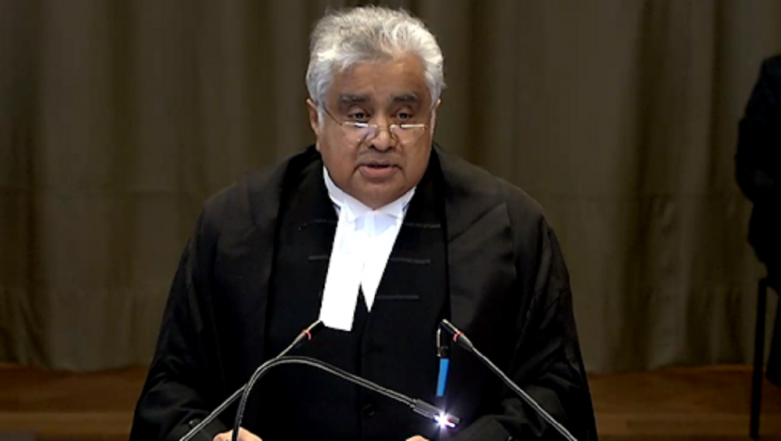Eminent legal luminary Harish Salve’s remarks have reignited the contentious debate over including the terms “secular” and “socialist” in the Indian Constitution’s Preamble. Speaking in an interview with Republic TV, Salve questioned the necessity of these additions, highlighting historical resistance from key drafters like Dr. B.R. Ambedkar and B.N. Rau. His assertions call for a critical reassessment of these terms and their relevance in contemporary India.
Dr. Ambedkar, widely regarded as the chief architect of the Indian Constitution, along with drafting committee member B.N. Rau, believed that the principles of secularism and socialism were adequately embedded within the Constitution’s provisions. Their opposition to explicitly including these terms in the Preamble stemmed from the view that the values were already enshrined through fundamental rights, directive principles, and institutional safeguards. Yet, in 1976, during the Emergency imposed by Prime Minister Indira Gandhi, the words “secular” and “socialist” were added to the Preamble via the 42nd Constitutional Amendment. This decision, made without public consultation, has since been a point of contention.
Salve’s argument highlights a global perspective: many socialist nations refrain from explicitly mentioning socialism in their constitutions, and even countries celebrated for their secularism, like the United States, do not include the term “secular” in their constitutional text. This raises questions about the motivations behind the amendment and whether it truly reflects India’s constitutional ethos.

Salve’s reflections also touch upon Jawaharlal Nehru’s influence in shaping India’s early political framework. As India’s first Prime Minister, Nehru’s vision was pivotal, but it also faced criticism for sidelining other voices, including Ambedkar’s. Nehru’s insistence on certain ideological markers, despite resistance, underscores the political dynamics of the time. His policies were seen by some as a balancing act in the wake of Partition, which had led to the creation of Pakistan as an Islamic state. However, critics argue that this approach often alienated voices advocating for a more pluralistic or pragmatic approach.
The timing of Salve’s comments aligns with recent parliamentary debates on the Constitution’s legacy. During these discussions, Defence Minister Rajnath Singh accused the Congress party of undermining constitutional principles and autonomy of institutions. Singh’s remarks were part of a broader critique of the Congress’s governance history, highlighting actions such as the imposition of Emergency in 1975, repeated constitutional amendments, and the dismissal of democratically elected state governments.
Singh’s critique extended to the Congress’s perceived mishandling of Ambedkar’s legacy. He underscored how Ambedkar was forced to resign as India’s first Law Minister and subsequently faced systematic marginalization. By contrast, the BJP-led government, he argued, has sought to honour Ambedkar’s contributions, including posthumously awarding him the Bharat Ratna in 1990.
The Congress, led by its prominent leaders, has countered these accusations by accusing the BJP of undermining constitutional values. In her maiden parliamentary address, Congress leader Priyanka Vadra criticized the government for failing to uphold parliamentary decorum and alleged a disregard for constitutional institutions. Rahul Vinci’s (Gandhi) interventions similarly sought to highlight issues such as unemployment and farmers’ welfare, though critics argue his speeches lacked substantive evidence to support claims of constitutional erosion.
However, the Congress’s position remains fraught with contradictions. Their record, including the Shah Bano case reversal and suppression of dissent during the Emergency, often undermines their claims of defending constitutional integrity. Salve’s remarks inadvertently draw attention to these inconsistencies, questioning whether the Congress’s rhetoric aligns with its historical actions.
The debate over the Preamble’s wording reflects broader ideological divides within Indian politics. For the BJP, raising questions about “secular” and “socialist” aligns with its vision of redefining India’s identity in line with its ideological commitments. Critics, however, view this as an attempt to dilute the constitutional commitment to pluralism and social justice.
Salve’s intervention has opened a Pandora’s box, compelling both supporters and detractors of the current Preamble to reevaluate their positions. Should the Preamble remain as it is, or is it time to revisit the 42nd Amendment’s legacy? This question is no longer academic but deeply political, as it touches upon the core of India’s constitutional identity and the principles that should guide its future.
The inclusion of “secular” and “socialist” in the Preamble remains a polarizing issue, reflecting tensions between India’s historical vision and contemporary realities. Ambedkar’s original vision aimed to build a robust, inclusive framework without overt ideological labels, but subsequent political developments shifted this balance. As India grapples with its constitutional legacy, I, as a responsible journalist, strongly believe that fostering informed, non-partisan debate is imperative. In this context, Salve’s remarks serve as a timely and crucial reminder to revisit foundational questions about India’s identity and how its Constitution can best reflect these ideals in the 21st century.






